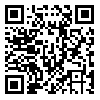Volume 28 - Supplementary
IBJ 2024, 28 - Supplementary: 117-117 |
Back to browse issues page
Download citation:
BibTeX | RIS | EndNote | Medlars | ProCite | Reference Manager | RefWorks
Send citation to:



BibTeX | RIS | EndNote | Medlars | ProCite | Reference Manager | RefWorks
Send citation to:
Aghaei M, Gheisavandi O, Sahebi M, Etesam F. Validity and Reliability of the Persian Version of the Alzheimer's Disease Knowledge Scale Among Iranian Healthcare Professionals. IBJ 2024; 28 :117-117
URL: http://ibj.pasteur.ac.ir/article-1-4510-en.html
URL: http://ibj.pasteur.ac.ir/article-1-4510-en.html
Abstract:
Introduction: Alzheimer's Disease (AD) is a progressive neurodegenerative disorder that affects cognitive function. Due to its high prevalence, there has been an increasing demand for promoting public awareness about AD. Recent studies have shown that there is a lack of understanding about the disease in society, which can lead to more weakness and disability for patients as well as low quality of care. Various tools have been developed to measure people's awareness of this disorder, including questionnaires such as the Alzheimer's Disease Knowledge Scale (ADKS). This 30-item questionnaire includes risk factors, diagnosis, symptoms, and AD management. However, there is currently no Persian version of the ADKS, and this study aims to develop a Persian version of the questionnaire and evaluate its validity and reliability among Iranian healthcare professionals.
Methods and Materials: This cross-sectional study was conducted on 304 participants from Tehran healthcare professionals between March 2021 and April 2022. The sample was selected using a multi-stage cluster sampling method. All participants were assessed using a demographic form to collect information on participant characteristics such as age, gender, occupation, education, marital status, medical history, life experience, and familiarity with Alzheimer's Disease. The Persian version of the ADKS (P-AKDS) was developed through a forward-back-forward translation procedure, and two specialists reviewed content adaptation between the original and translated versions. The reliability of P-AKDS was estimated using Cronbach's Alpha and Test-Retest method. The validity of the questionnaire was assessed using the Content and Construct validity.
Results: This study showed strong content validity, good test-retest reliability (Pearson correlation coefficient of 0.53 and p-value of 0.016), and strong construct validity, with significant correlations between P-ADKS scores and education level, occupation, familial history of dementia, and experience with dementia. Divergent validity was also established through non-significant correlations with factors such as marital status, gender, and medical history of physical disease. The Content Validity Ratio (CVR) for P-ADKS was 0.99, and its overall reliability was moderate, with a Cronbach's alpha coefficient of 0.64.
Conclusion and Discussion: The present study successfully developed and validated the P-ADKS among Iranian healthcare professionals. The findings demonstrated strong content validity, good test-retest reliability, and strong construct validity, supporting the use of P-ADKS as a valid and reliable tool for measuring knowledge about Alzheimer's disease.
Methods and Materials: This cross-sectional study was conducted on 304 participants from Tehran healthcare professionals between March 2021 and April 2022. The sample was selected using a multi-stage cluster sampling method. All participants were assessed using a demographic form to collect information on participant characteristics such as age, gender, occupation, education, marital status, medical history, life experience, and familiarity with Alzheimer's Disease. The Persian version of the ADKS (P-AKDS) was developed through a forward-back-forward translation procedure, and two specialists reviewed content adaptation between the original and translated versions. The reliability of P-AKDS was estimated using Cronbach's Alpha and Test-Retest method. The validity of the questionnaire was assessed using the Content and Construct validity.
Results: This study showed strong content validity, good test-retest reliability (Pearson correlation coefficient of 0.53 and p-value of 0.016), and strong construct validity, with significant correlations between P-ADKS scores and education level, occupation, familial history of dementia, and experience with dementia. Divergent validity was also established through non-significant correlations with factors such as marital status, gender, and medical history of physical disease. The Content Validity Ratio (CVR) for P-ADKS was 0.99, and its overall reliability was moderate, with a Cronbach's alpha coefficient of 0.64.
Conclusion and Discussion: The present study successfully developed and validated the P-ADKS among Iranian healthcare professionals. The findings demonstrated strong content validity, good test-retest reliability, and strong construct validity, supporting the use of P-ADKS as a valid and reliable tool for measuring knowledge about Alzheimer's disease.

| Rights and permissions | |
 |
This work is licensed under a Creative Commons Attribution-NonCommercial 4.0 International License. |







.png)
